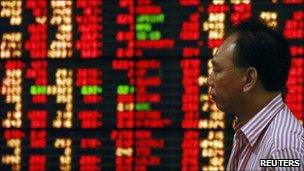How to catch a falling knife
- Published
- comments

When investors have it in their heads that the price of shares is falling, and those falls are reinforced by demands for increased collateral from those who lent to finance the share purchases, it is difficult to make any kind of rational prediction about when and where more than a week of share-price falls will be halted.
In Asia, overnight, there were at least signs that the magnitude of the share price drops may be easing. But then there was the same kind of evidence in Europe and the US yesterday, and that turned out to be a false dawn.
None of this would matter if the stock markets were in a hermetically sealed box, labelled speculation, insulated from the real economy.
But the problem is that investors' anxiety is based on evidence of economic slowdown in many of the developed western economies. And that anxiety has the propensity to become self-fulfilling.
For example, shares in major US banks slumped. Citigroup fell 16%, Bank of America was 20% down. They faced a double squeeze: the loss of America's AAA has the potential to increase the funding costs of US banks; Bank of America was hurt by a $10.5bn lawsuit from AIG claiming damages related to mortgage losses in the last crash.
When the traded equity in banks falls in price to that extent, those who lend to banks tend to become nervous, to wonder whether they are correctly assessing the risks of lending to those banks. And when banks find their access to funding becomes harder and more expensive, that has a negative impact on their ability to supply credit to their personal and business customers, and to other banks.
This is how credit crunches start.
But perhaps more importantly, if all the talk is the risk of renewed recession in two of the world's biggest markets, the US and the eurozone, companies think twice about making that big investment to increase capacity or about hiring extra people.
Careless share-price falls cost jobs, to paraphrase that World War II poster phrase.
For a vertiginous sense of how far share prices could fall, the best place to gaze may be through the looking glass at gold. JP Morgan, which is not normally seen as sensationalist in its forecasts, is predicting that the gold price could rise from $1,700 to $2,500 by the end of the year.
If anxiety about the value of financial assets is such that gold - perceived as the last safe haven in the storm - is to soar by almost 50% in four months, heaven help us.
What could bring stability?
Well the underlying cause of this mess is the same as it was in the banking crash and Great Recession of 2007-9 - which is the recycling of the great surpluses of the exporting nations, China, Germany and Japan, into the unsustainable debts of the great consuming nations, the US, UK, and much of the eurozone.
Between 1998 and 2006, the high-savings economies - China, Japan, Germany - produced $1 trillion a year more than they consumed; and those of us in the rich deficit countries increased our indebtedness by $1tn a year to buy the stuff they produced.
Those so-called imbalances have not been corrected. Our lifestyles in the UK, US and much of the eurozone are still financed on cheap money, much of it in effect recycled from the savings of the countries that sell to us.
If you look at what's happened since 2008, banking debt has been reduced in the UK; but the corollary has been a rise in public-sector debt. The aggregate of debt bearing down on the UK economy remains at more-or-less record levels equivalent to around 400% of GDP.
As for a huge element of that indebtedness, household debt, that's fallen from around 180% of disposable income in 2008 to nearer 160%. But official forecasts by the Office for Budget Responsibility for any kind of meaningful economic recovery in the UK are predicated on that household indebtedness rising back to around 180% of disposable in the coming few years.
That either means the recovery won't actually materialise, because households won't want to borrow on that scale, or it means that the economy will remain vulnerable to an interest rate shock for the foreseeable future (if interest rates rise, the spending power of consumers would be devastated).
The solution to all of this is the same as it ever was. The high-savings economies, China, Japan, Germany, would have to spend and consume more - to boost global demand, create a market for the goods and services of the UK, US and so on, and help the indebted economies reduce their debts in a less painful way.
Growth generated by domestic spending in China, Japan and Germany would be optimal way out of the current crisis of financial and economic confidence, so long as the indebted countries took the opportunity to reduce their excessive debts.
That has been the obvious answer for some time. However, even with the rise of the G20 as the main global economic decision making body, with China, India, Brazil, Russia and South Africa all at the top table, the world appears to lack the governance architecture to achieve the conditions for this kind of enduring economic reform.